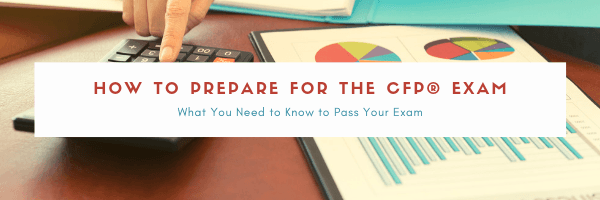Gearing up for the CFP® Exam can be a daunting task. But with the right practice, prep and persistence, that passing grade could be just a few steps away.
What You Need To Know: The six-hour CFP® Exam is offered three times a year at over 265 testing sites across the country, according to the CFP Board.
Studying for the CFP is a Necessity: The July 18, 2018 exam had a pass rate of 56.1%, according to CFP.net. The first-time test takers’ pass rate was 60.4% at the July exam and the repeat takers’ pass rate was 43.9%. Historically, the exam has a pass rate ranging from the high of 65.5% in 2016 to the low of 56.1% in July of 2018.
The exam is meant to make the professionals in the finance industry stand out with the elite credential.
“The CFP® Certification Examination is designed to assess your ability to apply financial planning knowledge to real-life financial planning situations. By passing this exam, you demonstrate to the public that you are at the appropriate level of competency required to practice financial planning,” the CFP Board states on its website.
Get your copy of the CFP® Exam Candidate Handbook here.
Get Game Day Ready: According to Financial-Planning.com, the six-hour exam and eight-hour day are intense. Test takers need to be fueled, so ensure that you eat a hearty breakfast and bring your own lunch to alleviate extra stress. Bring scrap paper, a calculator and dress comfortably for a long day of computer work.
Who Should Take the CFP Exam? Those very same professionals and students that should be taking our SMU Certificate Program in Financial Planning. The two go hand-in-hand. If you are a financial planner, accountant, investment advisor, stockbroker, trust officer, attorney, insurance agent, banker, retirement advisor or benefits specialist looking to add both education and an expert certification to your resume, then the exam should be on your to-do list once you complete the program.
Any planner can call him or herself a financial planner, but according to the CFP Board, “only those who have fulfilled the certification and renewal requirements of the CFP Board can display the CFP® certification marks, which represent a high level of competency, ethics, and professionalism. CFP Board’s Standards of Professional Conduct require CFP® professionals to look out for your interests above their own when delivering financial planning advice.”
SMU Can Help You Achieve Your CFP Goals: At SMU, we offer the Certificate Program in Financial Planning. Our program combines expert instructors, CFP®-Board registered curriculum and flexible course schedules to provide the premier financial planning educational program in North Texas. This certificate program at SMU is offered in three different paths. The Traditional Path which meets one night per week on our Dallas campus; the Pacesetter Path, which meets two nights per week on our Dallas campus; and the Intensive 11-Month Cohort Program meets one night per week and about one Saturday per month. Our next program begins on September 24.
Key Benefits of SMU’s Financial Planning Program: Through SMU’s Certificate Program in Financial Planning, you will earn the education requirements needed to be eligible for the CFP® Certification Examination. In addition, you will earn that coveted certificate in financial planning and be able to bring those assets to your own career and to your clients.
The CFP Board does require candidates for CFP® certification to hold a bachelor’s degree before they receive the CFP® certification. For specific details on the requirements, visit the CFP Board’s Web site.
SMU Financial Planning Certificate Courses Include: Fundamentals of Financial Planning: 101; Insurance & Risk Management: 102; Investments 103; Retirement Planning & Employee Benefits: 104; Tax Planning: 105; Estate Planning: 106; Financial Planning Strategies & Case Studies (Capstone): 107.
For information on The SMU Certificate Program in Financial Planning click here or visit smu.edu/pro.
For more information on The CFP® certification process visit their website at cfp.net.
